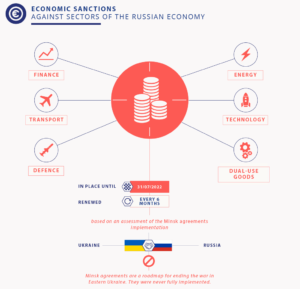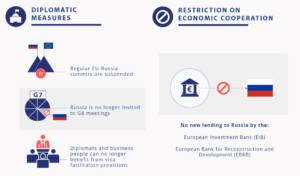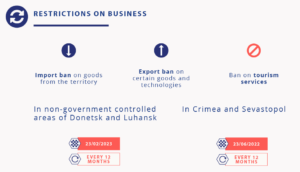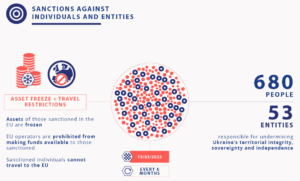ForumIAS announcing GS Foundation Program for UPSC CSE 2025-26 from 19 April. Click Here for more information.
ForumIAS Answer Writing Focus Group (AWFG) for Mains 2024 commencing from 24th June 2024. The Entrance Test for the program will be held on 28th April 2024 at 9 AM. To know more about the program visit: https://forumias.com/blog/awfg2024
Contents
- 1 Introduction
- 2 What is the meaning of Sanctions?
- 3 What sanctions have been imposed on Russia?
- 4 What is the rationale behind the imposition of sanctions?
- 5 What are the impacts of sanctions?
- 6 How effective would be the present sanctions against Russia?
- 7 What are the reasons behind the ineffectiveness of sanctions?
- 8 What lies ahead?
- 9 Conclusion
| For 7PM Editorial Archives click HERE → |
Introduction
The Russian invasion of Ukraine has been met with myriad sanctions imposed by many western nations. Imposing economic sanctions is often seen as an alternative to military intervention and escalation of conflict. The idea is that sanctions cause economic damage and coerce the target to change its objectionable course of action. The impact of the sanctions is a debatable issue, despite their widespread use. The effectiveness is closely dependent upon a nation’s power and prestige in the International order. In the current scenario, the huge military potential and support of other powers like China are limiting the impact of sanctions on Russia.
What is the meaning of Sanctions?
Sanctions are coercive measures that can be applied to diplomatic, economic and cultural relations between states. Commonly non-military in nature, they are imposed by one state against another (unilateral sanctions) or by an international organization, such as the United Nations (collective sanctions). Historically, measures have ranged from comprehensive sanctions (wide ranging and broad-based) to more targeted measures like prohibiting trade in particular items, such as arms, essential goods etc. Sanctions are also targeted at particular individuals and groups who pose a threat to peace and security, including political elites, rebel groups, or terrorist organisations.
Economic sanctions are multidimensional. They tend to include financial sanctions, restrictions on businesses and travel bans etc. Financial sanctions consist of targeted asset freezes and restrictions on a wide variety of financial markets and services e.g., access to international money markets or cross-country financial transactions and settlements for trade.
What sanctions have been imposed on Russia?
The international community has imposed a mix of economic and diplomatic sanctions, with countries acting both unilaterally and collectively.
The US and the UK have introduced unilateral sanctions targeting Russia’s two largest banks, Sberbank and VTB Bank. They have also frozen the assets and restricted travel of key Russian oligarchs.
Germany has indicated it is abandoning the Nord Stream 2 Baltic Sea gas pipeline project, designed to double the flow of Russian gas direct to the country.
Poland, Czech Republic, Bulgaria and Estonia have closed their airspace for Russian airlines.
The EU, on the other hand, has quickly introduced asset freezes and travel bans preventing listed individuals from entering or transiting through EU territory. The list includes President Putin and Foreign Minister Lavrov directly.
Together with the US and the UK, the EU has also agreed to remove select Russian banks from the SWIFT banking system. It is the financial messaging infrastructure that links the world’s banks).
The Council of Europe in Strasbourg has also applied unprecedented diplomatic sanctions. It has suspended Russia from its rights of representation in the Committee of Ministers and in the Parliamentary Assembly.
These sanctions are in addition to those already in application since the takeover of Crimea in 2014.


Source: Council of the European Union
What is the rationale behind the imposition of sanctions?
Inducement for Talks: The primary reason behind sanctions is to induce the target State to alter its stance and start negotiations.
Encourage Discontent by Masses: Sanctions create severe hardships for the masses as many are unable to smoothly run their business or may face job losses in the wake of economic downturn. Widespread protests and demonstrations can coerce the State leaders to alter their stance.
Global Isolation: The sanctions instil a feeling of isolation from the global community and even friendly countries with the erring state start looking for alternatives. Denial of access to international financial systems severely reduce the ability to undertake trade and commerce exacerbating the isolation.
Avoiding Direct Military Conflict: It is a prudent way to get things done and avoid the brutal impact of a full fledged war especially when the target state has a huge military capabilities.
What are the impacts of sanctions?
Economic Instability: The sanctions impair the prevailing exchange and interest rates in a country thereby causing widespread misery among masses. For instance, the brunt of the ongoing economic sanctions has made the Ruble lose 40% of its value and interest rates have risen to 20%.
Food Crisis: The food security of the nation gets hindered as prices keep on rising e.g., the U.S. sanctions against Cuba contributed to a decline in the availability of nutritious foods and increased infectious diseases. Similar was the impact in Iraq in the 1990s.
Disruption in trade and investments: The country is unable to transact with fellow countries and its exports, imports, investment, future deals etc. all get jeopardized e.g., the recent SWIFT ban on Russia would make it tough to send money overseas or receive money from outside.
Dwindling of Social Indicators: It impairs the prevailing social indicators like infant mortality rate, maternal mortality rate etc.. due to severe hardships faced by the masses. For instance, the United Nations sanctions on Iraq doubled infant and under-five mortality rates.
Impact on non-target States: The sanctions also create challenges for countries that are dependent on resources supplied by the target state e.g., the freezing of the Nord Stream 2 pipeline project will adversely impact European nations. Germany is almost totally reliant on natural gas imports, with Russia meeting more than half of supplies to Germany in 2020.
How effective would be the present sanctions against Russia?
The West had imposed sanctions on Russia and its predecessor, the Soviet Union, earlier as well. Although they were largely ineffective. Failures include the 1980 American grain embargo when the USSR invaded Afghanistan in 1979 as well as export control and restrictions on technology transfer during the Cold War. The embargo did not discourage the USSR from its Afghan occupation, and the export controls did not significantly affect the Communist states.
Sanctions were also imposed on Russia in 2014 when President Vladimir Putin annexed the Crimea region of Ukraine. At that time, Russia underwent massive currency devaluation and the Central Bank of Russia burned a lot of forex reserves during that time period trying to keep the Rouble afloat. Since 2014, Russia has been able to stabilise the financial system and had nearly US$ 635 billion in gold and forex reserves as of early February 2022. While possible Western sanctions against Russian banks could lead to a surge in market volatility, Russia is likely to be able to withstand restrictions due to its abundant reserves.
Moreover, Russia is likely to cushion the effect of SWIFT ban through the SPFS (System for Transfer of Financial Messages), an equivalent of the SWIFT financial transfer system developed by the Central Bank of Russia. The Russians are reported to be collaborating with the Chinese on a possible venture, a potential challenger to SWIFT.
In addition, the West has not yet put sanctions on Russian exports of oil and gas even after 10 days of invasion. Oil and gas contribute close to 20% of Russia’s GDP, provide 40% of budgetary resources and 60 per cent of export revenues.
What are the reasons behind the ineffectiveness of sanctions?
Black Markets: The products can be purchased and sold through the black markets. Experts are speculating that Russia will also leverage the potential of crypto assets to reduce the impact of recent sanctions.
Lack of unanimity among enforcing Nations: The impact of sanctions gets reduced when there is no broad unanimity amongst the big powers e.g., Switzerland, though has expressed support to the West, has not frozen any assets owned by Russians in the banks within its jurisdiction.
National Interest over Economic Security: Countries consider national security superior to economic setbacks and often don’t bow down if their security is at stake e.g., the severe and universal sanctions against the Iraqi occupation of Kuwait in 1990 crippled the Iraqi economy. Although it did not change the mindset of Iraq’s dictator Saddam Hussein at all.
Alternatives to sanctions: Following the post-Crimea sanctions imposed in 2014, the use of SPFS by Central Bank of Russia which though a not a perfect substitute of SWIFT, but will allow some continuity in international exchange.
Dominant position of Leaders: Impact of sanctions gets diminished if the leaders of target states command a dominant position within the country and can’t be easily replaced e.g., Putin has been in power over the last 20 years, directly or indirectly. Similar is the situation of Kim Jong-un of North Korea or Saddam Hussein, who survived in Iraq for many years despite sanctions (and had to be removed through military intervention).
Veto by Permanent Members: The collective sanctions by the UN Security Council can only be imposed by the consent of all permanent members. Russia used its veto power to prevent imposition of collective UN sanctions in the recent crisis which induced countries to solely restrict to individual sanctions.
What lies ahead?
First, the magnitude of sanctions imposed on countries should be so impactful that the target state is coerced to come to the negotiation table e.g.,sanctions against Iraq and Iran were more comprehensive than the recent ones on Russia. All foreign assets were frozen in Iraq, and almost all the trade was halted.
Second, the imposition of sanctions should target critical areas for which the erring state has a large foreign dependency and no ready substitutes available e.g., oil and gas exports in case of Russia.
Third, along with sanctions, there should be perception building and awareness generation so that the native citizens compel the state leaders to change their stance. Stakeholders like diaspora in foreign nations and domestic and international media can be engaged in this regard.
Fourth, if sufficient results are not generated in the current crisis, then collective UN sanctions should be imposed using tools like ‘Uniting for Peace Resolution’. The resolution is used to resolve the deadlock of the UN Security Council and calls for convening an emergency meeting of the UN General Assembly.
Conclusion
Sanctions slowdown economic growth and development, widen the poverty gap, restricts access to food and medicines and exacerbates inequalities. They put a severe burden on common masses but achieve the purpose only when the target state is forced to a course-correction. The success of the sanctions in the past has been a mixed bag. The impact of the present sanctions on Russia is yet to be seen, however the initial observations indicate a limited impact so far.
Source: Indian Express






